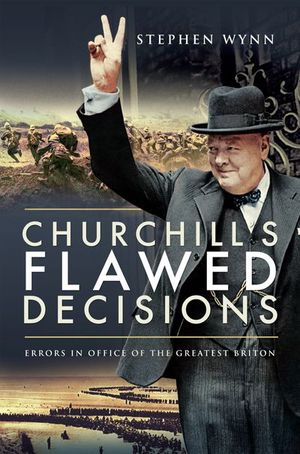Churchill's Flawed Decisions
Published by Pen & Sword Books
An examination of the political and military controversies that turned out to be missteps on the road to greatness for the British Prime Minister.
Winston Churchill is undoubtedly one of the most respected and best-loved characters England has ever known. However, much of how people view him is based on his leadership during the bleak and dire times of the Second World War. If it wasn’t for him, Britain would almost definitely have lost the war: there were those in government who encouraged Churchill to strike a deal with Hitler at the time of the Dunkirk evacuations, which took place just three weeks after he had been made Prime Minister, but he stuck resolutely to his guns and said, “no.”
However, Churchill was never the favorite to take over after Neville Chamberlain resigned. Indeed, everyone believed Lord Halifax would be the next Prime Minister, although even he thankfully recognized that Winston Churchill was the best man for the job, even though King George VI disagreed.
Yet there was another side to Churchill that is not often spoken of, and one that led to him making some questionable decisions. Some of these, it could be argued, were for national security reasons, but others were not, proving that even the very best are not always as perfect as they first appear.
This book looks at Churchill’s most questionable decisions throughout his career—from the Sidney Street Siege in London in January 1910 through the Bengal Famine of 1943 to the Mau Mau Uprising in British Kenya between 1952 and 1964.
Winston Churchill is undoubtedly one of the most respected and best-loved characters England has ever known. However, much of how people view him is based on his leadership during the bleak and dire times of the Second World War. If it wasn’t for him, Britain would almost definitely have lost the war: there were those in government who encouraged Churchill to strike a deal with Hitler at the time of the Dunkirk evacuations, which took place just three weeks after he had been made Prime Minister, but he stuck resolutely to his guns and said, “no.”
However, Churchill was never the favorite to take over after Neville Chamberlain resigned. Indeed, everyone believed Lord Halifax would be the next Prime Minister, although even he thankfully recognized that Winston Churchill was the best man for the job, even though King George VI disagreed.
Yet there was another side to Churchill that is not often spoken of, and one that led to him making some questionable decisions. Some of these, it could be argued, were for national security reasons, but others were not, proving that even the very best are not always as perfect as they first appear.
This book looks at Churchill’s most questionable decisions throughout his career—from the Sidney Street Siege in London in January 1910 through the Bengal Famine of 1943 to the Mau Mau Uprising in British Kenya between 1952 and 1964.
BUY NOW FROM
COMMUNITY REVIEWS

